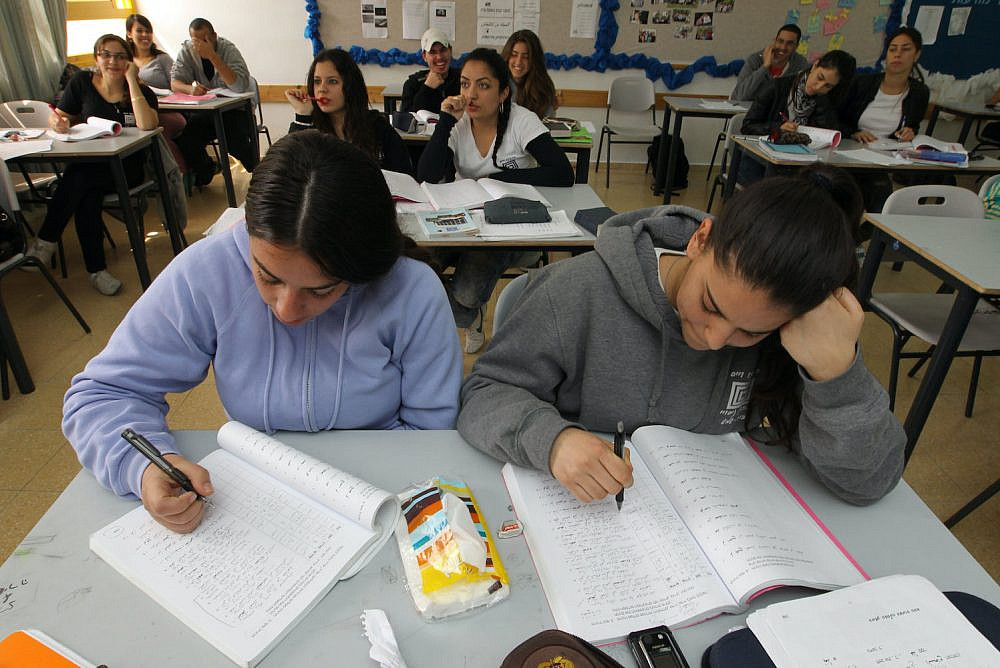
Top UK publishing company withdraws new school books after study finds that the revised materials are ‘emphatically pro-Israel.’
By Aron Keller
Illustrative photo of students completing assignments in a classroom. (Nati Shohat/Flash90)
For the second time in two years, a major international education company has withdrawn two British school textbooks on Middle East history, in response to accusations of bias regarding their Israel-Palestine content. Pearson, which also oversees national exams for 14- to 16-year-olds in the U.K., announced the decision on June 8 after an independent review by two British academics found “dangerously misleading” pro-Israel bias in the books.
The content in question was added to the textbooks in apparent consultation with British pro-Israel groups after they claimed the materials contained anti-Israel bias, echoing charges leveled at books used in the Palestinian school curriculum, and reflecting intensifying global efforts to remove content deemed critical of Israel from widely-used educational materials.
Pearson initially withdrew the textbooks in October 2019, in response to a petition by the U.K.’s Zionist Federation, citing a review commissioned by UK Lawyers for Israel (UKLFI) that labelled them “anti-Israel propaganda.” U.K. Jewry’s largest communal representative body, the Board of Deputies, joined in the chorus, demanding a “substantial rewrite” of the textbooks, which, it claimed, contained “insufficient reference to terrorist organisations” like Hamas, among other things.

Under pressure, Pearson ordered an independent review of the textbooks “The Middle East: Conflict, Crisis and Change, 1917-2012” and “Conflict in the Middle East, c1945-1995,” both authored by Hilary Brash. The review, conducted by educational organization Parallel Histories, determined there was “no overall evidence of anti-Israel bias” but did identify “some areas where the balance of sources could be improved.”
Despite these benign conclusions, Pearson withdrew the textbooks and produced updated versions. While Pearson insisted revisions made to the new editions “were based on the outcome of the independent review,” and that it “retained full editorial control of these changes throughout,” a statement released by the Board of Deputies in September 2020 claimed the Board worked with UKLFI “to produce thorough comments on both textbooks, which Pearson have received and acted upon,” and applauded Pearson for their “willingness to revise these textbooks” based on those recommendations.
The release of the revised textbooks did not settle the matter, however; their appearance prompted a fresh round of protests, this time led by two academics affiliated with the British Committee for the Universities of Palestine (BRICUP).
John Chalcraft, a professor of Middle East history and politics at the London School of Economics, said he first heard about Pearson’s “one-sided” editorial process through media reports. After raising his concerns about pro-Israel bias with Pearson in November 2020, Chalcraft and his colleague James Dickins, a professor of Arabic at the University of Leeds, undertook a line-by-line study of the textbooks, comparing the revised editions with the originals. The “extraordinary number of changes” made to the books, the study concludes, transformed the texts into “propaganda under the guise of education.”
The alterations were “so numerous, so blatantly one-sided, so disproportionately designed to exonerate Israel, that it does allow one to be a little surprised that a reputable, international publisher would preside over such a process for a GCSE textbook,” Chalcraft told +972 Magazine, referring to the national exams taken by 14- to 16-year-olds in the U.K.
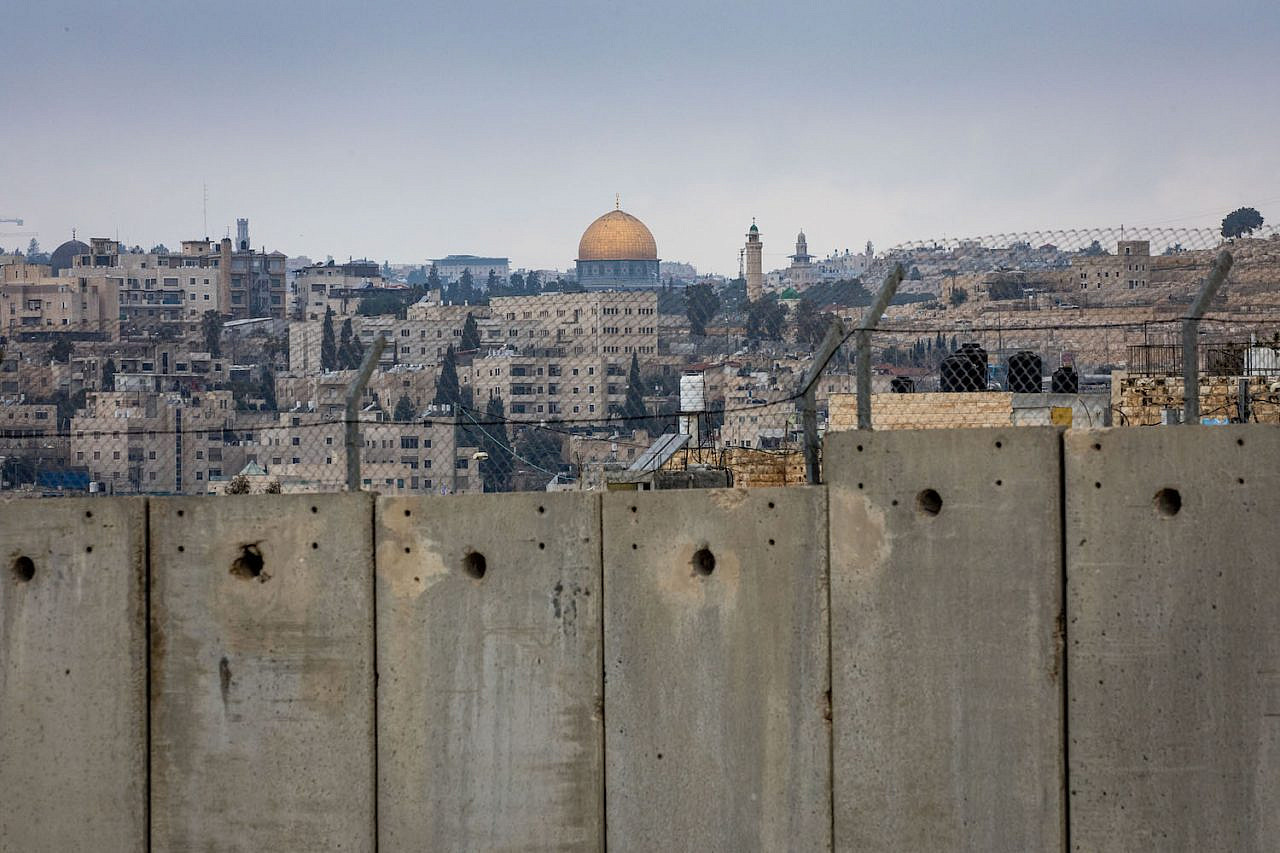
View of the separation wall and Al-Aqsa compound in the background on February 2, 2020. (Olivier Fitoussi/Flash90)
This radical overhaul, he believes, was the result of “misguided and blundering attempts by Pearson to manage perceived reputational and legal threats posed by pro-Israel groups.”
Biased treatment
One example of “biased treatment” cited in the report by Chalcraft and Dickins relates to international law. According to the original versions of the textbooks, “international law states that a country cannot annex or indefinitely occupy territory gained by force” — a basic principle enshrined in the 1949 Fourth Geneva Convention. The amended version, however, prefixes “Some argue” to this sentence. According to Chalcraft, adding these two words “sweeps away seven decades of international jurisprudence, turning an overwhelming consensus into a minority, debatable opinion.”
In other cases, altering a single word was enough to “make a substantial difference,” the report states. For example, the original edition describes the 1948 Deir Yassin massacre, in which pre-state Zionist forces killed over 100 Palestinian civilians, as “one of the worst atrocities of the 1948 war;” in the revised edition, the word “atrocities” is replaced by “acts.”
Chalcraft and Dickins additionally note that while references to Jewish violence in the original version were removed or contextualized, in the new version, instances of Arab or Palestinian aggression were magnified. The original textbook stated that the “arms and fingers of [Palestinian] child stone throwers were broken [by Israeli soldiers]” during the First Intifada; the revised version omits this fact.
In total, the pair identified 294 changes to the new textbook, averaging more than three per page. Most of these were “emphatically pro-Israel,” the report concludes.
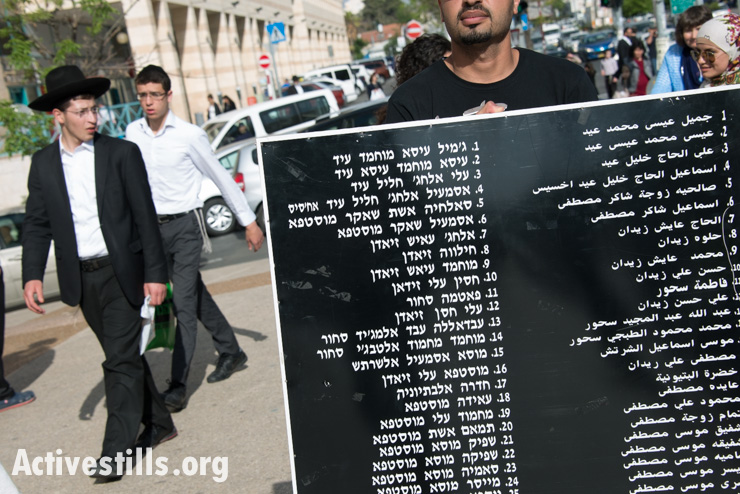
Israeli Jewish youth watch a procession of Israeli, Palestinian, and international activists carrying names of those who died in the Deir Yassin massacre, Givat Shaul, West Jerusalem, April 10, 2014. (Activestills.org)
Pearson did not directly respond to +972’s questions regarding the publishing company’s withdrawal of the textbooks, and whether it was planning to republish or update the materials. Instead, its director of corporate affairs, Anna O’Sullivan, shared a June press release in which the company confirmed that it would pause its distribution of the books while it reviews its editorial process.
Damaged trust
Reflecting on the wider implications of the textbook revisions, Chalcraft said that Pearson needs to take steps to “make clear publicly what went wrong [with the revisions], and to explain how they plan to put it right, in order to restore the confidence of educators, parents, students, and the wider public.”
According to one British mother of Palestinian descent, who spoke to +972 on the condition of anonymity to protect her family’s privacy, the textbook affair has damaged her son’s trust in the education system. Fearing he would not receive an accurate account of Palestinian history, he has chosen not to pursue history as a GCSE subject, she said.
Salwa Abu-Wardeh, a Palestinian educator and member of Makan, a U.K.-based educational nonprofit focused on Palestine, shares these concerns. “As a Palestinian parent, I expect the truth about the history of my people and what they experienced, and are still experiencing, to be taught in my children’s classrooms,” she said. She added that the U.K. Education Department has a unique responsibility to ensure children learn about Britain’s historic role in ongoing dispossession, displacement, and oppression in Israel-Palestine.
In 1916, the U.K. and France signed a secret treaty dividing areas that had been under Ottoman rule, known as the Sykes-Picot Agreement. In 1917, the U.K. government issued the Balfour Declaration, supporting “the establishment in Palestine of a national home for the Jewish people” and disregarding the equivalent right to self-determination of Palestinian Arabs already living there. Palestine was under British mandatory rule from 1920 to 1948, when the state of Israel was founded, during which time the British presided over and contributed to rising violence between Jewish and Arab nationalist movements.
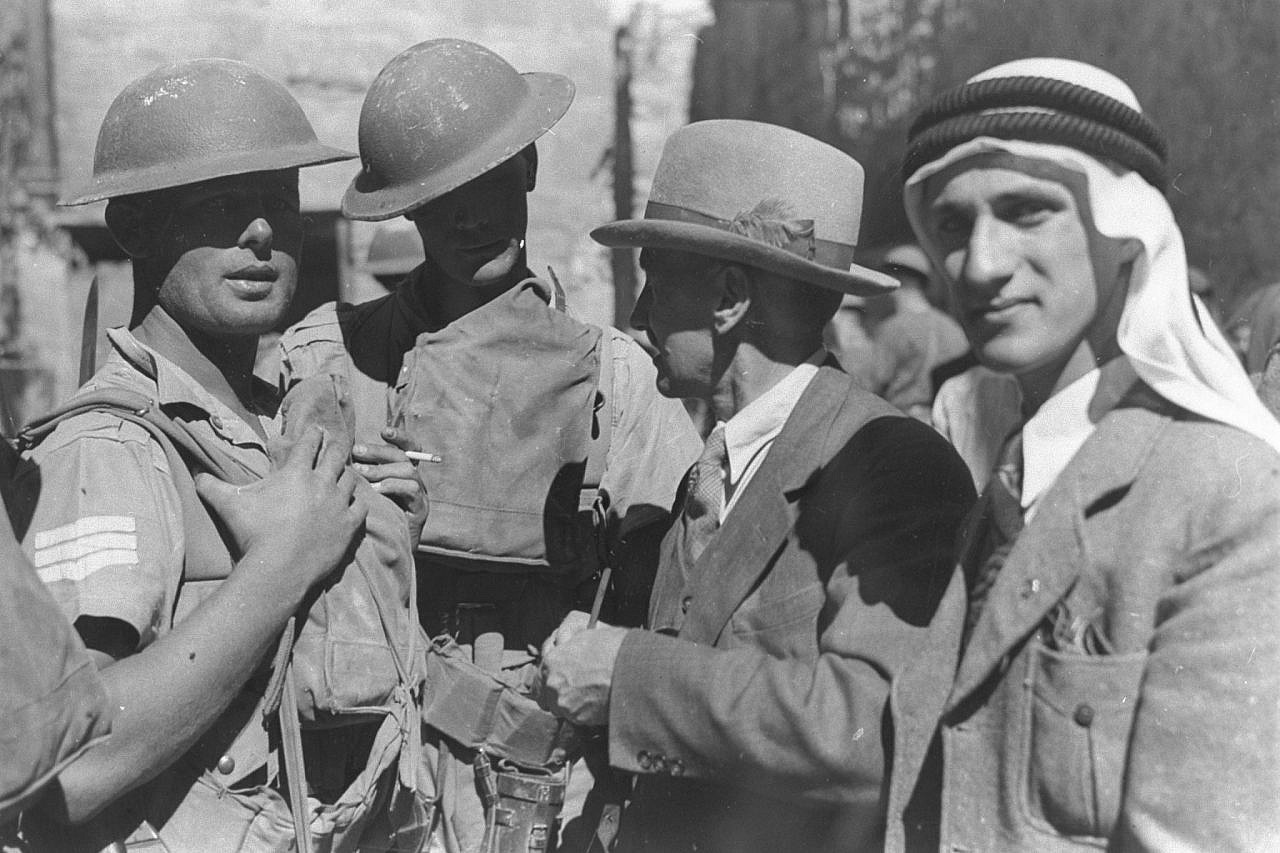
British soldiers on duty in the Old City of Jerusalem speak with a Palestinian resident (right) and photographer Eric Matson (center), October 30, 1938. (American Colony/GPO)
Abu-Wardeh also sees the withdrawal of Pearson’s textbooks as part of a wider need to move away from historical “accounts [that] implicitly portray white European colonizers as heroic, ‘fully formed’ figures while marginalising the legitimate contributions of the colonized at best, and blaming them for their own misfortune and suffering at worst.”
Mischaracterizing Palestinian education
The controversy over Israel-Palestine content in educational materials is a broadening global trend. For example, California only recently approved its ethnic studies curriculum for high schools, after years of fierce debate and multiple drafts in which education about the conflict became a key point of contention between Jewish and Arab-American groups.
For decades, the Palestinian school curriculum has been a focal point of pro-Israel advocacy, mostly hinging on the claim that its textbooks are saturated with antisemitism. But several independent investigations have debunked the characterization of Palestinian education as a catalyst for anti-Jewish violence.
Last month, the world-renowned Georg Eckert Institute for International Textbook Research published its two-year EU-funded study into the Palestinian Authority’s curriculum. Of the 172 texts analyzed, researchers identified one chapter in an Islamist textbook with antisemitic content, which was later altered; the overwhelming majority of Palestinian textbooks “adhered to UNESCO standards” and displayed a “strong focus on human rights,” the report concluded. The report also noted that some texts contained “a narrative of resistance within the context of the Israeli-Palestinian conflict” and “antagonism towards Israel.” This narrative is set against more than half a century of Israeli occupation.
An earlier version of the Eckert report was leaked in August 2020, but its findings did not deter British pro-Israel groups from continuing to make false characterizations of the Palestinian curriculum. In February, a coalition of pro-Israel groups comprising the Zionist Federation, Board of Deputies, Jewish Leadership Council, and We Believe in Israel hosted a webinar entitled “Educate for Peace: Stop Funding Incitement in the Palestinian Curriculum.” One of the speakers at the event was Marcus Sheff, who leads the Institute for Monitoring Peace and Cultural Tolerance in School Education (IMPACT-SE), an Israeli textbook-monitoring organization that has been at the forefront of efforts to scrutinize the Palestinian curriculum, as well as Islamic curricula worldwide.
In 2018, the U.K. government claimed IMPACT-SE’s research was “not objective in its findings and lacked methodological rigour.” In 2002, the EU suggested that the organization, then known as the Center for Monitoring the Impact of Peace, had mistranslated and fabricated quotations to support “unfounded” claims of anti-Jewish incitement.
A large study carried out in 2013 by the interfaith organization the Council for Religious Institutions in the Holy Land, meanwhile, found that “[d]ehumanizing and demonizing characterizations of the other were very rare in Israeli and Palestinian books,” although it did identify instances of bias on both sides. The U.S. State Department’s 2009 Human Rights Report reached a similar conclusion.
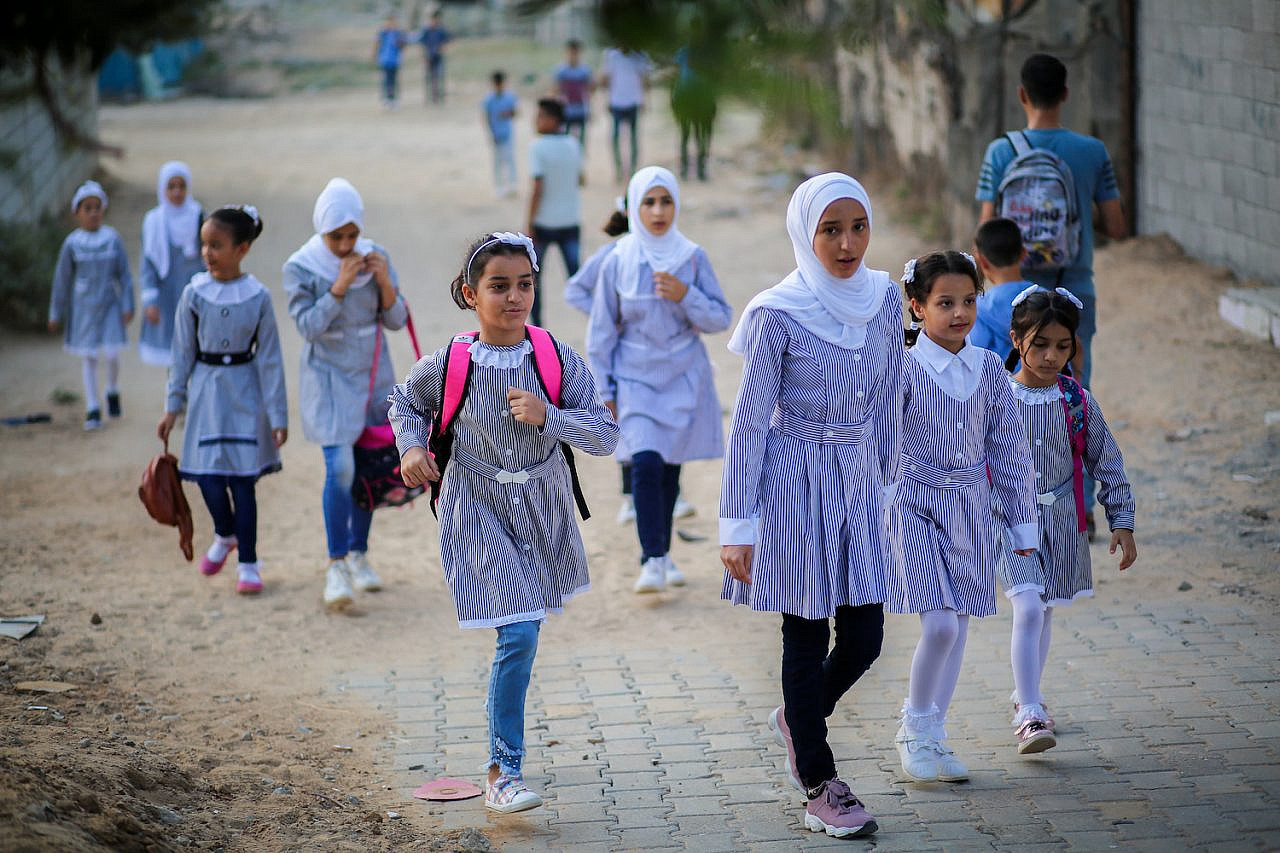
Palestinian students walk to school on the first day of school, in Gaza City, August 25, 2019. (Hassan Jedi/Flash90)
By contrast, a five-year study published in 2011 by the Israeli scholar Nurit Peled-Elhanan found that Israeli school textbooks consistently depicted Palestinians as “refugees, primitive farmers, and terrorists,” but never as a “normal person.”
The Pearson textbook controversy coincides with a conspicuous response by British teachers to a wave of pro-Palestine protests in schools following the latest round of violence in Israel-Palestine. Teachers reportedly disciplined dozens of students for expressing solidarity with Palestinians; the U.K.’s Education Secretary Gavin Williamson condemned schools for permitting “an atmosphere of intimidation or fear for other students and teachers,” and stressed that school heads have “legal duties regarding political impartiality.”
But for Makan’s Abu-Wardeh, terms such as “impartiality” or “even-handed” can be “disingenuous and misleading” in the context of Israel-Palestine, where there is an “inherent power imbalance between an oppressive powerful state and an oppressed stateless people.
“At its core, this is not a controversial or complicated issue, and there are no two ‘equal sides,’” said Abu-Wardeh. “Empathy and compassion are values at the heart of education, and disciplining children for speaking up in support of Palestinians, or any other oppressed or marginalized community, goes directly against these core values. We should be encouraging our children to stand up for justice and equality — not punishing them when they do.”



